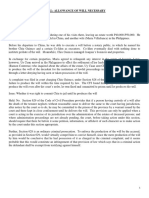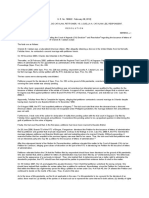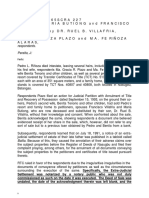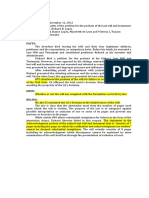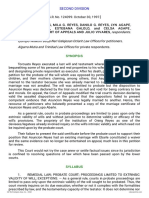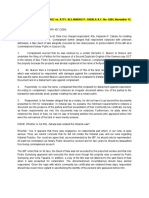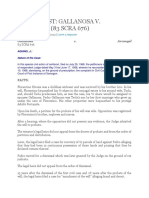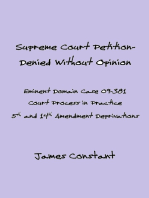0 ratings0% found this document useful (0 votes)
Civ Digest Part 2 Pastor Azuela
Civ Digest Part 2 Pastor Azuela
Uploaded by
Anonymous vdN7avUH0The document discusses three cases related to probate proceedings. The first case examines whether a probate order resolved questions of ownership. The second case examines testamentary capacity. The third case examines whether a will was properly executed and attested.
Copyright:
© All Rights Reserved
Available Formats
Download as DOCX, PDF, TXT or read online from Scribd
Download as docx, pdf, or txt
Civ Digest Part 2 Pastor Azuela
Civ Digest Part 2 Pastor Azuela
Uploaded by
Anonymous vdN7avUH00 ratings0% found this document useful (0 votes)
The document discusses three cases related to probate proceedings. The first case examines whether a probate order resolved questions of ownership. The second case examines testamentary capacity. The third case examines whether a will was properly executed and attested.
Original Description:
Civil Law Cases
Original Title
Civ-Digest-Part-2-Pastor-Azuela (1)
Copyright
© © All Rights Reserved
Available Formats
DOCX, PDF, TXT or read online from Scribd
Share this document
Did you find this document useful?
Is this content inappropriate?
The document discusses three cases related to probate proceedings. The first case examines whether a probate order resolved questions of ownership. The second case examines testamentary capacity. The third case examines whether a will was properly executed and attested.
Copyright:
© All Rights Reserved
Available Formats
Download as DOCX, PDF, TXT or read online from Scribd
Download as docx, pdf, or txt
0 ratings0% found this document useful (0 votes)
Civ Digest Part 2 Pastor Azuela
Civ Digest Part 2 Pastor Azuela
Uploaded by
Anonymous vdN7avUH0The document discusses three cases related to probate proceedings. The first case examines whether a probate order resolved questions of ownership. The second case examines testamentary capacity. The third case examines whether a will was properly executed and attested.
Copyright:
© All Rights Reserved
Available Formats
Download as DOCX, PDF, TXT or read online from Scribd
Download as docx, pdf, or txt
You are on page 1/ 5
G.R. No.
L-56340 June 24, 1983
SPOUSES ALVARO PASTOR, JR. and MA. ELENA ACHAVAL DE PASTOR,
petitioners,
vs.
THE COURT OF APPEALS, JUAN Y. REYES, JUDGE OF BRANCH I, COURT OF
FIRST INSTANCE OF CEBU and LEWELLYN BARLITO QUEMADA, respondents.
PLANA, J.:
FACTS:
Alvaro Pastor Sr. and Sofia Bossio had two legitimate children, namely, Alvaro Pastor Jr. and
Sofia Pastor de Midgely. Also, Pastor, Sr., had an illegitimate child by the name of Lewellyn
Barlito Quemada. When, Pastor Sr. and Bossio died, Quemada filed a petition for the probate
and allowance of an alleged holographic will of Pastor Sr. with the CFI. The will contained only
one testamentary disposition: a legacy in favor of Quemada consisting of 30% of Pastor Sr.’s
42% share in the operation by Atlas Consolidated Mining and Development Corporation.
Consequently, Pastor Jr., and Sofia filed their opposition thereto. Thereafter, the CFI issued an
order allowing the will to probate. Aggrieved, petitioner appealed before the CA, but the latter
affirmed the decision of the lower court.
ISSUE:
WON the Probate Order resolved with finality the questions of ownership and intrinsic validity
of the will.
RULING:
NO.
In a special proceeding for the probate of a will, the issue by and large is restricted to the
extrinsic validity of the will, i.e., whether the testator, being of sound mind, freely executed the
will in accordance with the formalities prescribed by law. As a rule, the question of ownership is
an extraneous matter which the Probate Court cannot resolve with finality. Thus, for the
purpose of determining whether a certain property should or should not be included in the
inventory of estate properties, the Probate Court may pass upon the title thereto, but such
determination is provisional, not conclusive, and is subject to the final decision in a separate
action to resolve title.
Nowhere in the dispositive portion of the Probate Order is there a declaration of ownership of
specific properties. On the contrary, it is manifest therein that ownership was not resolved. For
it confined itself to the question of extrinsic validity of the win, and the need for and propriety of
appointing a special administrator. Thus, it allowed and approved the holographic will "with
respect to its extrinsic validity, the same having been duly authenticated pursuant to the
requisites or solemnities prescribed by law."
G.R. No. 174489 April 11, 2012
ANTONIO B. BALTAZAR, SEBASTIAN M. BALTAZAR, ANTONIO L.
MANGALINDAN, ROSIE M. MATEO, NENITA A. PACHECO, VIRGILIO REGALA,
JR., and RAFAEL TITCO, Petitioners,
vs.
LORENZO LAXA, Respondent.
DEL CASTILLO, J.:
FACTS:
Paciencia was a 78 year old spinster when she made her last will and testament on September
13, 1981. Childless and without any brothers or sisters, Paciencia bequeathed all her properties
to respondent Lorenzo R. Laxa and his wife Corazon F. Laxa and their children Luna Lorella
Laxa and Katherine Ross Laxa. Lorenzo is Paciencia’s nephew whom she treated as her own son.
Later, Paciencia died. Consequently, on April 27, 2000, Lorenzo filed a petition with the RTC for
the probate of the Will of Paciencia and for the issuance of Letters of Administration in his favor.
Thereafter, petitioners filed an opposition asking the RTC to deny the probate of Paciencia’s
Will. Subsequently, the RTC ruled in favor of petitioners. It stated that at the time Paciencia
signed the Will, she was no longer possessed of sufficient reason or strength of mind to have
testamentary capacity. Upon appeal, the CA reversed the RTC Decision and granted the probate
of the Will of Paciencia.
ISSUE:
WON Paciencia’s Will may be subjected to probate proceedings.
RULING:
YES.
The burden to prove that Paciencia was of unsound mind at the time of the execution of the will
lies on the shoulders of the petitioners. Petitioners, through their witness Rosie, claim that
Paciencia was "magulyan" or forgetful so much so that it effectively stripped her of testamentary
capacity.
Forgetfulness is not equivalent to being of unsound mind.
A.C. No. 5281 February 12, 2008
MANUEL L. LEE, petitioner,
vs.
ATTY. REGINO B. TAMBAGO, respondent.
CORONA, J.:
FACTS:
Complainant Manuel L. Lee charged respondent Atty. Regino B. Tambago with violation of the
Notarial Law and the ethics of the legal profession for notarizing a spurious last will and
testament. Complainant averred that his father, the decedent Vicente Lee, Sr., never executed
the contested will. Furthermore, the spurious will contained the forged signatures of Cayetano
Noynay and Loreto Grajo, the purported witnesses to its execution. In his answer, respondent
claimed that the complaint against him contained false allegations. Moreover, he stated that the
complaint was filed simply to harass him because the criminal case filed by complainant against
him in the Office of the Ombudsman "did not prosper." Subsequently, the matter was referred to
the IBP for investigation, report and recommendation. Thereafter, the respondent was found
guilty for violation of pertinent provisions of the old Notarial Law as found in the Revised
Administrative Code. As a result, respondent was suspended from the practice of law for one
year. Furthermore, together with the revocation of his notarial commission, he was also
disqualified from reappointment as Notary Public for a period of 2 years.
ISSUE:
WON the will was executed pursuant to the formalities provided by law.
RULING:
NO.
A notarial will, as the contested will in this case, is required by law to be subscribed at the end
thereof by the testator himself. In addition, it should be attested and subscribed by three or
more credible witnesses in the presence of the testator and of one another. The will in question
was attested by only two witnesses, Noynay and Grajo. On this circumstance alone, the will must
be considered void.
The Civil Code likewise requires that a will must be acknowledged before a notary public by the
testator and the witnesses. A cursory examination of the acknowledgment of the will in question
shows that this particular requirement was neither strictly nor substantially complied with. For
one, there was the conspicuous absence of a notation of the residence certificates of the notarial
witnesses Noynay and Grajo in the acknowledgment. Similarly, the notation of the testator’s old
residence certificate in the same acknowledgment was a clear breach of the law. These omissions
by respondent invalidated the will.
As the acknowledging officer of the contested will, respondent was required to faithfully observe
the formalities of a will and those of notarization.
G.R. No. 189984 November 12, 2012
IN THE MATTER OF THE PETITION FOR THE PROBATE OF THE LAST WILL AND
TESTAMENT OF ENRIQUE S. LOPEZ RICHARD B. LOPEZ, Petitioner,
vs.
DIANA JEANNE LOPEZ, MARYBETH DE LEON and VICTORIA L. TUAZON,
Respondents.
PERLAS-BERNABE, J.:
FACTS:
On June 21, 1999, Enrique S. Lopez died leaving his wife, Wendy B. Lopez, and their four
legitimate children, namely, petitioner Richard B. Lopez and the respondents Diana Jeanne
Lopez, Marybeth de Leon and Victoria L. Tuazon as compulsory heirs. Before Enrique’s death,
he executed a Last Will and Testament and constituted Richard as his executor and
administrator. Subsequently, Richard filed a petition for the probate of his father's Last Will and
Testament before the RTC. However, Marybeth and Victoria opposed the petition. Later, the
RTC disallowed the probate of the will for failure to comply with Article 805 of the Civil Code
which requires a statement in the attestation clause of the number of pages used upon which the
will is written. Accordingly, while the acknowledgment portion stated that the will consists of 7
pages including the page on which the ratification and acknowledgment are written, the RTC
observed that it has 8 pages including the acknowledgment portion. On appeal, the CA affirmed
the decision of the lower court.
ISSUE:
WON the will was valid.
RULING:
NO.
The law is clear that the attestation must state the number of pages used upon which the will is
written. The purpose of the law is to safeguard against possible interpolation or omission of one
or some of its pages and prevent any increase or decrease in the pages.
The total number of pages, and whether all persons required to sign did so in the presence of
each other must substantially appear in the attestation clause, being the only check against
perjury in the probate proceedings.
G.R. No. 122880 April 12, 2006
FELIX AZUELA, Petitioner,
vs.
COURT OF APPEALS, GERALDA AIDA CASTILLO substituted by ERNESTO G.
CASTILLO, Respondents.
TINGA, J.:
FACTS:
Petitioner Felix Azuela sought to admit to probate the notarial will of Eugenia E. Igsolo before
the RTC. Petitioner is the son of the cousin of the decedent. Subsequently, the petition was
opposed by Geralda Aida Castillo, who represented herself as the attorney-in-fact of "the 12
legitimate heirs" of the decedent. Oppositor Geralda Castillo also argued that the will was not
executed and attested to in accordance with law. She pointed out that decedent’s signature did
not appear on the second page of the will, and the will was not properly acknowledged. Later,
the RTC admitted the will to probate. On appeal, the CA reversed the lower court’s decision due
to the fact that the attestation clause failed to state the number of pages used in the will, thus
rendering the will void and undeserving of probate.
ISSUE:
WON the will may be subjected for probate.
RULING:
NO.
A will whose attestation clause does not contain the number of pages on which the will is written
is fatally defective. A will whose attestation clause is not signed by the instrumental witnesses is
fatally defective. And perhaps most importantly, a will which does not contain an
acknowledgment, but a mere jurat, is fatally defective. Any one of these defects is sufficient to
deny probate. A notarial will with all three defects is just aching for judicial rejection.
You might also like
- Sample Motion to Vacate, Motion to Dismiss, Affidavits, Notice of Objection, and Notice of Intent to File ClaimFrom EverandSample Motion to Vacate, Motion to Dismiss, Affidavits, Notice of Objection, and Notice of Intent to File Claim5/5 (23)
- Vda de Reyes V Ca, GR No. 92436 2. Spas Villafria V Plazo, GR No. 1875524No ratings yetVda de Reyes V Ca, GR No. 92436 2. Spas Villafria V Plazo, GR No. 18755247 pages
- Probate Mandatory: Rule 75 Production of Will: Allowance of Will NecessaryNo ratings yetProbate Mandatory: Rule 75 Production of Will: Allowance of Will Necessary22 pages
- Merope Enriquez Vda. de Catalan, Petitioner, vs. Louella A. Catalan-Lee, Respondent.No ratings yetMerope Enriquez Vda. de Catalan, Petitioner, vs. Louella A. Catalan-Lee, Respondent.2 pages
- Vda. de Catalan v. Catalan-Lee, GR No. 183622, February 8, 2012 (Art 26)No ratings yetVda. de Catalan v. Catalan-Lee, GR No. 183622, February 8, 2012 (Art 26)12 pages
- Facts:: Vda de Chua vs. CA GR No. 70909, January 5, 1994No ratings yetFacts:: Vda de Chua vs. CA GR No. 70909, January 5, 19946 pages
- 125470-1997-Reyes - v. - Court - of - Appeals PDFNo ratings yet125470-1997-Reyes - v. - Court - of - Appeals PDF8 pages
- Vda. de Catalan v. Catalan-Lee, GR No. 183622, February 8, 2012 (Art 26)No ratings yetVda. de Catalan v. Catalan-Lee, GR No. 183622, February 8, 2012 (Art 26)13 pages
- XXII. Partition - Casilang, Sr. Vs Casilang, Jr.No ratings yetXXII. Partition - Casilang, Sr. Vs Casilang, Jr.2 pages
- Testate Estate of CARLOS GIL, Deceased. ISABEL HERRERO VDA. DE GIL, Administratrix-Appellee, vs. PILAR GIL VDA. DE MURCIANO, Oppositor-AppellantNo ratings yetTestate Estate of CARLOS GIL, Deceased. ISABEL HERRERO VDA. DE GIL, Administratrix-Appellee, vs. PILAR GIL VDA. DE MURCIANO, Oppositor-Appellant5 pages
- CD Mitra vs. Sablan Guevarra G.R. No. 213994 April 18 2018No ratings yetCD Mitra vs. Sablan Guevarra G.R. No. 213994 April 18 20182 pages
- RTC: The Trial Court Admitted The Decedent's Holographic Will To Probate. While The Fact That It WasNo ratings yetRTC: The Trial Court Admitted The Decedent's Holographic Will To Probate. While The Fact That It Was19 pages
- Wills Law and Contests: Writing a Valid Will, Trust Administration, and Trust Fiduciary DutyFrom EverandWills Law and Contests: Writing a Valid Will, Trust Administration, and Trust Fiduciary Duty2/5 (1)
- Supreme Court Eminent Domain Case 09-381 Denied Without OpinionFrom EverandSupreme Court Eminent Domain Case 09-381 Denied Without OpinionNo ratings yet
- Facts:: The Issue in The Case at Bar, Had Already Been Laid To Rest inNo ratings yetFacts:: The Issue in The Case at Bar, Had Already Been Laid To Rest in7 pages
- The Role of Translation in Developing ESP Learners' Reading Comprehension Skills-A Case Study of Medical Students at Najran University-KSANo ratings yetThe Role of Translation in Developing ESP Learners' Reading Comprehension Skills-A Case Study of Medical Students at Najran University-KSA11 pages
- TAPEC and GALANO vs. COURT OF APPEALS and DELOS REYES vs. THE HON. COURT OF APPEALSNo ratings yetTAPEC and GALANO vs. COURT OF APPEALS and DELOS REYES vs. THE HON. COURT OF APPEALS1 page
- MOOT PROPOSITION 4TH ALL INDIA MOOT COURT COMPETITION 2025 (1)No ratings yetMOOT PROPOSITION 4TH ALL INDIA MOOT COURT COMPETITION 2025 (1)5 pages
- Goldloop Properties, Inc. vs. Government Service Insurance System, 678 SCRA 73, G.R. No. 171076 August 1, 2012100% (1)Goldloop Properties, Inc. vs. Government Service Insurance System, 678 SCRA 73, G.R. No. 171076 August 1, 201220 pages
- Omaira Lomondot and Saripa Lomondot vs. BalindongNo ratings yetOmaira Lomondot and Saripa Lomondot vs. Balindong2 pages
- Polk County Judge: Melanie Mansell Candidate QuestionnaireNo ratings yetPolk County Judge: Melanie Mansell Candidate Questionnaire5 pages
- Salitico vs. Heirs of Resurreccion Martinez Felix 901 SCRA 585 April 10 2019No ratings yetSalitico vs. Heirs of Resurreccion Martinez Felix 901 SCRA 585 April 10 20192 pages
- Letter From Retired Judges On KBJ Presentencing ReportsNo ratings yetLetter From Retired Judges On KBJ Presentencing Reports2 pages
- Case History: Fenello Letter To Multi-State RegulatorsNo ratings yetCase History: Fenello Letter To Multi-State Regulators1 page
- Procedure For Transcription of Stenographic NotesNo ratings yetProcedure For Transcription of Stenographic Notes3 pages
- Sample Motion to Vacate, Motion to Dismiss, Affidavits, Notice of Objection, and Notice of Intent to File ClaimFrom EverandSample Motion to Vacate, Motion to Dismiss, Affidavits, Notice of Objection, and Notice of Intent to File Claim
- Vda de Reyes V Ca, GR No. 92436 2. Spas Villafria V Plazo, GR No. 1875524Vda de Reyes V Ca, GR No. 92436 2. Spas Villafria V Plazo, GR No. 1875524
- Probate Mandatory: Rule 75 Production of Will: Allowance of Will NecessaryProbate Mandatory: Rule 75 Production of Will: Allowance of Will Necessary
- Merope Enriquez Vda. de Catalan, Petitioner, vs. Louella A. Catalan-Lee, Respondent.Merope Enriquez Vda. de Catalan, Petitioner, vs. Louella A. Catalan-Lee, Respondent.
- Vda. de Catalan v. Catalan-Lee, GR No. 183622, February 8, 2012 (Art 26)Vda. de Catalan v. Catalan-Lee, GR No. 183622, February 8, 2012 (Art 26)
- Facts:: Vda de Chua vs. CA GR No. 70909, January 5, 1994Facts:: Vda de Chua vs. CA GR No. 70909, January 5, 1994
- Vda. de Catalan v. Catalan-Lee, GR No. 183622, February 8, 2012 (Art 26)Vda. de Catalan v. Catalan-Lee, GR No. 183622, February 8, 2012 (Art 26)
- Testate Estate of CARLOS GIL, Deceased. ISABEL HERRERO VDA. DE GIL, Administratrix-Appellee, vs. PILAR GIL VDA. DE MURCIANO, Oppositor-AppellantTestate Estate of CARLOS GIL, Deceased. ISABEL HERRERO VDA. DE GIL, Administratrix-Appellee, vs. PILAR GIL VDA. DE MURCIANO, Oppositor-Appellant
- CD Mitra vs. Sablan Guevarra G.R. No. 213994 April 18 2018CD Mitra vs. Sablan Guevarra G.R. No. 213994 April 18 2018
- RTC: The Trial Court Admitted The Decedent's Holographic Will To Probate. While The Fact That It WasRTC: The Trial Court Admitted The Decedent's Holographic Will To Probate. While The Fact That It Was
- Wills Law and Contests: Writing a Valid Will, Trust Administration, and Trust Fiduciary DutyFrom EverandWills Law and Contests: Writing a Valid Will, Trust Administration, and Trust Fiduciary Duty
- Supreme Court Eminent Domain Case 09-381 Denied Without OpinionFrom EverandSupreme Court Eminent Domain Case 09-381 Denied Without Opinion
- Facts:: The Issue in The Case at Bar, Had Already Been Laid To Rest inFacts:: The Issue in The Case at Bar, Had Already Been Laid To Rest in
- The Role of Translation in Developing ESP Learners' Reading Comprehension Skills-A Case Study of Medical Students at Najran University-KSAThe Role of Translation in Developing ESP Learners' Reading Comprehension Skills-A Case Study of Medical Students at Najran University-KSA
- TAPEC and GALANO vs. COURT OF APPEALS and DELOS REYES vs. THE HON. COURT OF APPEALSTAPEC and GALANO vs. COURT OF APPEALS and DELOS REYES vs. THE HON. COURT OF APPEALS
- MOOT PROPOSITION 4TH ALL INDIA MOOT COURT COMPETITION 2025 (1)MOOT PROPOSITION 4TH ALL INDIA MOOT COURT COMPETITION 2025 (1)
- Goldloop Properties, Inc. vs. Government Service Insurance System, 678 SCRA 73, G.R. No. 171076 August 1, 2012Goldloop Properties, Inc. vs. Government Service Insurance System, 678 SCRA 73, G.R. No. 171076 August 1, 2012
- Polk County Judge: Melanie Mansell Candidate QuestionnairePolk County Judge: Melanie Mansell Candidate Questionnaire
- Salitico vs. Heirs of Resurreccion Martinez Felix 901 SCRA 585 April 10 2019Salitico vs. Heirs of Resurreccion Martinez Felix 901 SCRA 585 April 10 2019
- Letter From Retired Judges On KBJ Presentencing ReportsLetter From Retired Judges On KBJ Presentencing Reports
- Case History: Fenello Letter To Multi-State RegulatorsCase History: Fenello Letter To Multi-State Regulators






